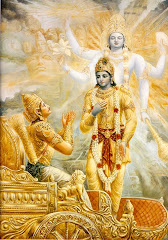

Every year we celebrate or commemorate some or the other occasion and I am not merely referring to festivals. This year (year 2009 or more precisely on February 12th, 2009) we commemorated the bicentennial or the 200th anniversary of the birth of two historic figures, whose ideas and actions shaped the modern world - the evolutionary biologist Charles Darwin and President Abraham Lincoln, the 16th President of the United States (US), who successfully led the US through its greatest internal crisis, the American Civil War, preserving the Union and ending slavery. As the war was drawing to a close, Lincoln became the first American President to be assassinated. Special events marking the occasion are planned throughout the world especially in England where Darwin was born on February 12th in 1809 (coincidentally, Lincoln too was born on the same day). This year's also the 150th anniversary of the publication of the famed naturalist's most important work, "On the Origin of Species by Means of Natural Selection," a book that revolutionized the science of biology, and despite enormous amounts of evidence in its favour remains controversial to this day. A series of events (especially in the US, in the UK and other parts of Europe) will take this opportunity to reflect on both Darwin's and Lincoln's roles in the history of ideas and to celebrate their lives.
On the other hand, we have succeeded in completely overlooking another important occasion - the 100th anniversary of the publication of the "Arthashastra," - (written in the period 321 - 296 B.C.) - the ancient Indian treatise on statecraft, economic policy and military strategy, authored by the the world's original political realist, Chanakya (also known as Kautilya). Kautilya's long forgotten wisdom from the 3rd and 4th century B.C. was restored to modern India when Dr. R. Shamashastri of Mysore discovered a manuscript of the "Arthashastra" in 1904, then edited and published it to great acclaim in 1909. Please read my blogs: "The Genius of Chanakya, the Man of Destiny." and "Chanakya, the 'Yug Purush' and the Chanakya legend." to know more about the life and times of this great polymath, this visionary... this Yug Purush.
For scientists, Darwin’s 200th birthday anniversary is an opportunity to reflect on how far knowledge about our natural world has come since the publication of the "On the Origin of Species," and to examine the future direction of biology and other disciplines. For historians and political scientists, the bicentennial of Abraham Lincoln’s birthday has taken on a whole new meaning with the election of the first African American President, and Lincoln’s eloquent words will be featured, perhaps more than ever before. As it becomes more consequential for world politics in the twenty-first century, India would do well to revisit her own realist tradition so solidly reflected in the "Ramayana," the "Mahabharata," the "Panchatantra," the "Arthashastra," the "Nitishastra," the "Shukra-Niti," the "Niti-Shataka," and the "Brihaspati Samhita" of "Garuda Purana," among others. There is a need for a rising India to create a strategic vocabulary - one which is her very own. It has been all too easy to borrow political terminology from the West. Chanakya (also referred to as Kautilya), who preceded Niccolò Machiavelli by more than a millennium, should be seen as the world's original political realist. The very fact that Chanakya made his arguments about statecraft, power and governance, without a reference to religion or divinity, makes him a true political scientist as well as the founder/father of political science. The stress was not on "religion" but on "dharma," that elusive word which lays down what is right and indicates one's righteous duty. He was also the pioneer economist of the world.
There is a need for some serious introspection, a need for soul searching - to understand as to where we went wrong in the last millennium or in the last one thousand years, that the great Empires and the Vedic civilization collapsed, that this great land saw the advent of conquerors after conquerors... the ones who could not be rebuffed or defeated, and this land was plundered of her wealth and saw the forced demise of a part of her culture. Paying mere lip service to our culture and traditions and reminiscing about our past glories will not do and is not enough. A glorious past is no guarantee for a shining future unless we are prepared to jettison petty-mindedness for serious intent to execute the common goal of making India (Bharatavarsha) emerge as a great power in the 21st century.
It is said that, "Rome was not built in a day," and today (21st April, 2009) is the 2,762nd anniversary of the founding of Rome (according to the Gruppo Storico Romano or the Roman Historical Group). The Romans are celebrating big time, despite the fact that the actual date is lost in the mists of time. The Ancient Roman society is important to modern times, especially in the West where it is seen as a touchstone of civilisation. They left behind detailed legal and civil documents, complex engineering solutions and the linguistic and political legacy of a unified Europe. (Yet its foundation anniversary is based on the myth of the twin brothers - Romulus and Remus, sons of a priestess and the God of war, who were suckled by a wolf and each founded a city on the seven hills before Romulus murdered Remus). Rome was founded in the late Vedic era, during which the sophisticated Indian (Indus/Vedic) civilisation and culture surpassed any in the West. They already had complex political and social systems, astronomy, vedic mathematics, geometry, economics, military science, medicines and surgery, even veterinary science. They could cure cataract, calculate to the power of 10, were aware of such concepts as gravitation, and the value of pi were common knowledge. The Indian numerals which is the first positional base 10 numeral systems in the world have originated from Gupta India (during the Gupta Empire - early 4th to mid-8th century AD; other records suggest it was between 240 - 550 AD). They even knew that calendars must include leap years. The great epics, the "Ramayana" and the "Mahabharata", were written, as well as many sacred texts while the Vedas are timeless - they are as old as time itself. The Sanskrit language, like Latin, has devolved into many languages that are spoken today. It is seldom realized that even in the "Ramayana" and the "Mahabharata" there are innumerable references to technology, arts, sports, music, dance, architecture, weaponry, defense, textiles, navigation and metallurgy.
Today, the names of such luminaries as, Kalidas, Panini, Bhasa, Bana, Varahamihira and Bhartrahari remain faint memories. Charaka, Sushruta, Bhaskaracharya or Lilavati are names that rarely evoke recognition. Other names that have faded into oblivion are those of the famous mathematician-astronomers, Varahamihira and Aryabhatta. Aryabhatta is believed to be the first to have come up with the concept of zero, postulated the theory that the Earth moves round the Sun, and studied the solar and lunar eclipses. Even the 4th century AD Sanskrit poet Kalidasa, who was a great playwright, and who wrote plays such as the "Shakuntala," (which is said to have inspired the celebrated German poet, novelist and playwright, Goethe), and marked the highest point of Sanskrit literature (infact, he is often wrongly referred to as the "Shakespeare" of India) is all but a distant memory today. In the past, in her own way India excelled in many fields including - and that should not come as a surprise - science, arts, medicine, engineering, politics, economics, warfare and governance.
I have listed down some of Chanakya's teachings from the "Arthasastra," which is a monumental treatise of the ancient world that possesses great importance even in these times, over here:
1. "Do not be very upright in your dealings for you would see by going to the forest that straight trees are cut down while crooked ones are left standing."
2. "The serpent, the King, the tiger, the stinging wasp, the small child, the dog owned by other people, and the fool: these seven ought not to be awakened from sleep."
3. "The happiness and peace attained by those satisfied by the nectar of spiritual tranquillity is not attained by greedy persons restlessly moving here and there."
4. "He who lives in our mind is near though he may actually be far away; but he who is not in our heart is far though he may really be nearby."
5. "Do not keep company with a fool for as we can see he is a two-legged beast. Like an unseen thorn he pierces the heart with his sharp words."
6. "Purity of speech, of the mind, of the senses, and the of a compassionate heart are needed by one who desires to rise to the divine platform."
7. "Let not a single day pass without your learning a verse, half a verse, or a fourth of it, or even one letter of it; nor without attending to charity, study and other pious activity."
8. "One whose knowledge is confined to books and whose wealth is in the possession of others, can use neither his knowledge nor wealth when the need for them arises."
9. "We should not fret for what is past, nor should we be anxious about the future; men of discernment deal only with the present moment."
10. "He who is overly attached to his family members experiences fear and sorrow, for the root of all grief is attachment. Thus one should discard attachment to be happy."
11. "The one excellent thing that can be learned from a lion is that whatever a man intends doing should be done by him with a whole-hearted and strenuous effort."
12. "A debt should be paid off till the last penny, and an enemy should be destroyed till the last trace."
13. "Do not reveal what you have thought upon doing, but by wise council keep it secret being determined to carry it into execution."
14. "There is poison in the fang of the serpent, in the mouth of the fly and in the sting of a scorpion; but the wicked man is saturated with it."
15. "Water is the medicine for indigestion; it is invigorating when the food that is eaten is well digested; it is like nectar when drunk in the middle of a dinner; and it is like poison when taken at the end of a meal."
16. "There is no austerity equal to a balanced mind, and there is no happiness equal to contentment; there is no disease like covetousness, and no virtue like mercy."
17. "Who is there who has not been overcome by the ravages of time? What beggar has attained glory? Who has become happy by contracting the vices of the wicked?"
18. "The life of an uneducated man is as useless as the tail of a dog which neither covers its rear end, nor protects it from the bites of insects."
19. "Even as the unborn babe is in the womb of his mother, these five are fixed as his life destiny: his life span, his activities, his acquisition of wealth and knowledge, and his time of death."
20. "If one has a good disposition, what other virtue is needed? If a man has fame, what is the value of other ornamentation?"
21. "A man is born alone and dies alone; and he experiences the good and bad consequences of his karma alone; and he goes alone to hell or the Supreme abode."
22. "The earth is supported by the power of truth; it is the power of truth that makes the sun shine and the winds blow; indeed all things rest upon truth."
23. "Moral excellence is an ornament for personal beauty; righteous conduct, for high birth; success for learning; and proper spending for wealth."
24. "It is better to die than to preserve this life by incurring disgrace. The loss of life causes but a moment's grief, but disgrace brings grief every day of one's life."
25. "He who shall practice these twenty virtues shall become invincible in all his undertakings."
26. "As a single withered tree, if set aflame, causes a whole forest to burn, so does a rascal son destroy a whole family."
27. "Education is the best friend. An educated person is respected everywhere. Education beats the beauty and the youth."
28. "As soon as the fear approaches near, attack it and destroy it."
29. "Although an ass is tired, he continues to carry his burden; he is unmindful of cold and heat; and he is always contented; these three things should be learned from the ass."
30. "What is it that escapes the observation of poets? What is that act women are incapable of doing? What will drunken people not prate? What will not a crow eat?"
31. "As long as your body is healthy and under control and death is distant, try to save your soul; when death is immanent what can you do?"
32. "Scriptural lessons not put into practice are poison; a meal is poison to him who suffers from indigestion; a social gathering is poison to a poverty stricken person; and a young wife is poison to an aged man."
33. "The wise man should restrain his senses like the crane and accomplish his purpose with due knowledge of his place, time and ability."
34. "O wise man! Give your wealth only to the worthy and never to others. The water of the sea received by the clouds is always sweet."
35. "Rain which falls upon the sea is useless; so is food for one who is satiated; in vain is a gift for one who is wealthy; and a burning lamp during the daytime is useless."
36. "Before you start any work, always ask yourself three questions - Why am I doing it? What the results might be? And Will I be successful? Only when you think deeply and find satisfactory answers to these questions, go ahead."
37. "Even if a snake is not venomous, it should pretend to be."
38. "He who befriends a man whose conduct is vicious, whose vision impure, and who is notoriously crooked, is rapidly ruined."
39. "Never make friends with people who are above or below you in status. Such friendships will never give you any happiness." Variant version: "Friendship should be among equals."
40. "The biggest guru-mantra is: Never share your secrets with anybody. It will destroy you."
Note on Machiavelli: Niccolò di Bernardo dei Machiavelli (3 May 1469 - 21 June 1527) - was a philosopher, writer and Italian politician, considered to be the founder of modern political science. As a Renaissance Man, he was a diplomat, political philosopher, musician, poet, and playwright, but, foremost, he was a Civil Servant of the Florentine Republic. He is most famous for a short political treatise, "Il Principe" ("The Prince"), a work of realist political theory, however, both it and the more substantive republican Discourses on Livy went unpublished until the 1530s - after Machiavelli's death. Although he privately circulated "The Prince" among friends, the only work he published in his life was, "The Art of War," about high-military science. Since the sixteenth century, generations of politicians remain attracted and repelled by the cynical (realist) approach to power exposited in The Prince, the Discourses and the History. Whatever his personal intentions (still debated even to this day), his surname yielded the modern political words, "Machiavelli" (a person of acute and scheming intelligence) and "Machiavellianism" (the employment of cunning and deceit/duplicity in politics/statecraft or in general conduct) - according to the OED - and was first cited in 1626. The word has a similar use in modern psychology.
Machiavelli, according to the popular view, although this is disputed at least in part by most Machiavelli scholars, held that people were by nature untrustworthy, malevolent and self-serving, and thus those in power could only maintain their position through exploitative and deceitful actions. See also Machiavellian intelligence.
Note: Information gathered courtesy Wikipedia and thinkexist.com. Pictures courtesy Wikipedia.
Photographs: (in clockwise order)
1. A picture depicting Chanakya (or Kautilya) writing the "Chanakya Niti."
2. A picture of the the evolutionary biologist, Charles Darwin.
3. A photo-portrait of Abraham Lincoln, the 16th President of the United States.
4. A portrait of Niccolò di Bernardo dei Machiavelli by Santi di Tito.
















No comments:
Post a Comment